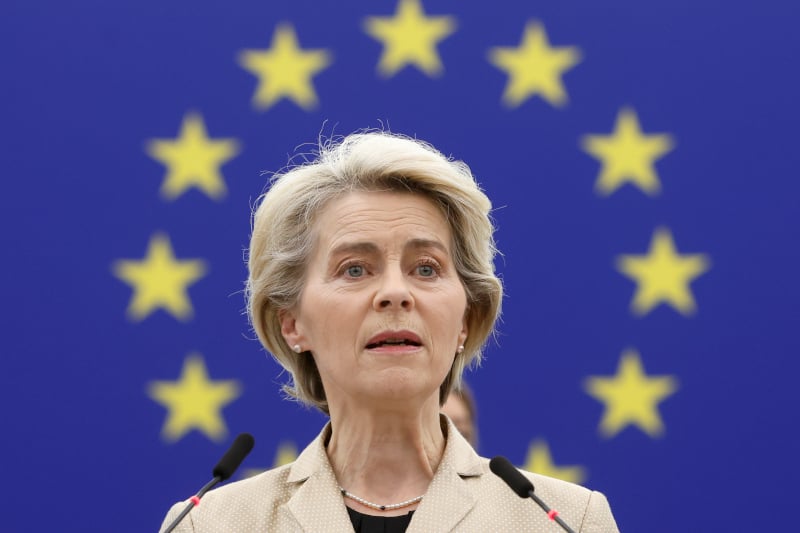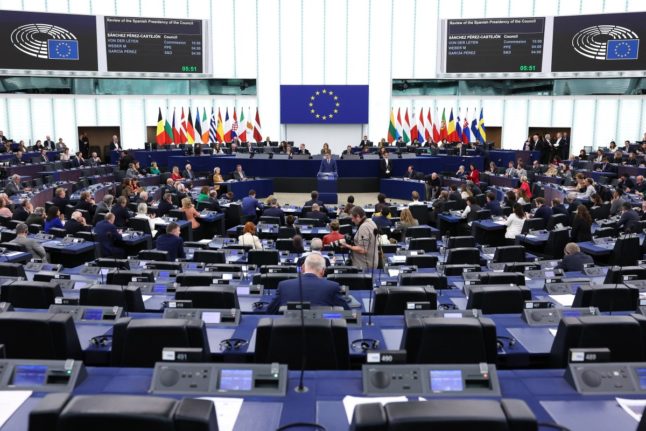Why does the European Parliament matter? What powers does it have?
Plenty of hot button issues – like national defence and healthcare – are still largely decided by national parliaments. That’s likely to remain so, but the European Parliament has power to act in a few key areas.
It scrutinises all laws the EU’s executive – or the European Commission – proposes and it can also request legislation. Plenty of recent high-profile EU laws have come at its insistence. These include the end of roaming charges in the EU and GDPR, which now sets data privacy standards around the globe.
Besides regulations on tech and artificial intelligence, expect MEPs to be debating a lot of legislation around consumer protection, food safety, certain action on climate change and transition like the European Green Deal, trade deals, as well as Europe’s support for Ukraine and whether it will eventually be a member of the EU.
European election results will also have some influence over whether Ursula von der Leyen – the first German to be European Commission President since the 1960s – gets another term.

READ ALSO: Who is Germany’s Ursula von der Leyen, the surprise candidate to take the EU’s top job?
How are the elections expected to go?
Polls show the centre-right Christian Democrats and their Bavarian sister party the Christian Social Union have a sizeable lead for the European elections in Germany. Also, although the far-right Alternative for Germany (AfD) has climbed to over 20 percent at points in national polls, it’s numbers for European elections are trending somewhat lower.
EUROPAWAHL | Sonntagsfrage Ipsos/Euronews
Union: 29% (+0,1)
SPD: 17% (+1,2)
GRÜNE: 16% (-4,5)
AfD: 16% (+5,0)
BSW: 7% (NEU)
LINKE: 4% (-1,5)
FDP: 4% (-1,4)
FW: 3% (+0,8)
Sonstige: 4% (-6,7)Änderungen zum Wahlergebnis von 2019
Verlauf: https://t.co/DCfbp5V3EK#EUWahl #EP2024 pic.twitter.com/ql6cnW5iif
— Deutschland Wählt (@Wahlen_DE) March 19, 2024
The same cannot be said for the populist right elsewhere in Europe, where polls everywhere from Austria to Sweden to France and the Netherlands show right-wing parties having the potential to make some big gains over their 2019 results.
At the same time, more centrist European political parties on the centre-left and centre-right are still likely to be able to keep a majority in the European Parliament according to the latest polls.
‘Wake-up call’: Far-right parties set to make huge gains in 2024 EU elections
So do MEPs represent their country in the European Parliament?
Technically, they’re not supposed to. MEPs are mandated to act in what they see as the interest of wider Europe – even if that conflicts with the interests of their own country. MEPs are still chosen in election contests that are run nationally though.
Every five years since 1979, voters around the European Union vote for 705 Members of the European Parliament (MEPs) in Brussels and Strasbourg. Each country gets a number of MEPs roughly proportional to its population. With Germany being the EU’s most populous country, it gets the most, with 96 seats.
However, MEPs don’t sit in the European Parliament based on country as they aren’t supposed to act in purely national interests – but looking at what they see as the interest of all of Europe. They sit in the European Parliament based on party group. So a Green from Germany and a Green from France will sit together. That German Green also won’t be sitting with the German Christian Democrats – who themselves will sit on the other side of the chamber with parties like Ireland’s Fine Gael – a fellow centre-right party.
European parliamentarians say they do that to encourage you to vote in a European way – considering the issues you think will impact all of Europe – rather than treat the European elections as a referendum on your own national government – which studies show often happens.
Elections to borders: 7 big changes in the EU that will impact you this year
Who gets to vote in Germany?
If you are a citizen of the European Union – so German, but also Irish, French, Italian, etc. – you can vote in the European elections. It’s important to note here that you don’t necessarily vote where you are from but instead vote from wherever you live in the EU. So if you’re an EU citizen living in Germany, you don’t need to be German to vote in the European elections in Germany. A German living in Spain would vote there, just as a Spaniard living here would vote here.
Voting in Germany in European elections is open to EU citizens 16 and older.
Germany is one national constituency and the vote is proportional. There also isn’t the same five percent threshold to get seats for European elections as there is for national elections, so smaller parties can sometimes get a seat.

EU citizens who live and are registered in Germany should have gotten a letter explaining that they have the right to vote. They may, however, have to register – particularly if they haven’t voted in Germany before. EU citizens who voted in the last European elections in 2019 in Germany shouldn’t have to register.
You’ll need to send a letter or bring a signed form in person to your local election office – and you can get that form online from the Bundeswahlleiterin.
That form also needs to be in by Sunday, May 19th – in time for you to be on the list for the elections in Germany on Sunday June 9th. Once you’re registered, you should be able to vote either in person or via postal ballot. You should also then get an information sheet detailing where you can vote or how to do it via postal ballot if you wish.
If you vote in person, make sure to bring you voter information and some identification showing your nationality. Your EU passport may be your safest bet.
READ ALSO: How to register to vote in Germany in the 2024 European elections




 Please whitelist us to continue reading.
Please whitelist us to continue reading.
Member comments